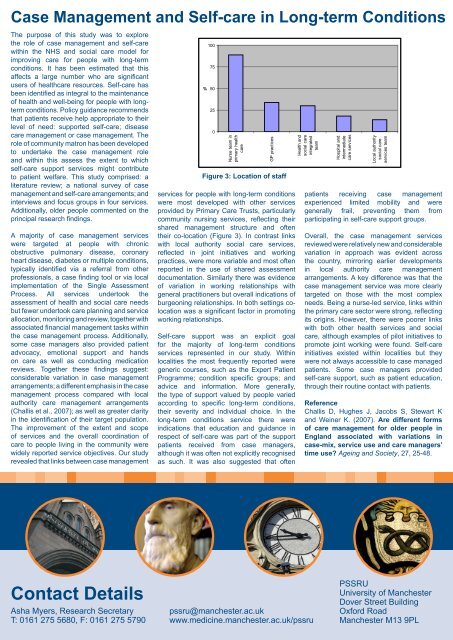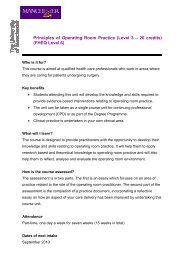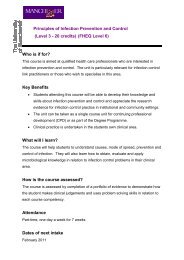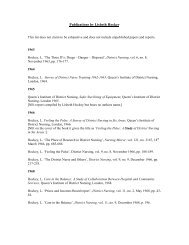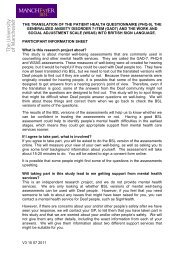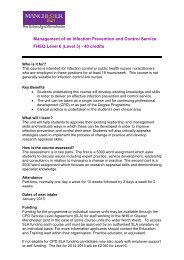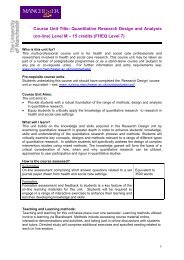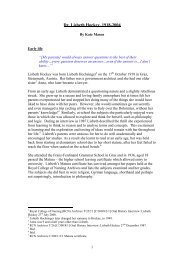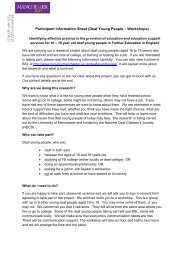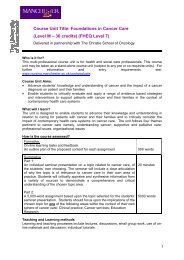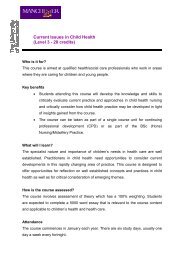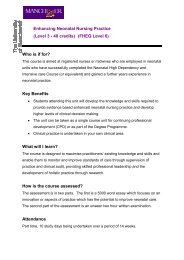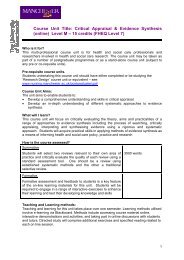Research Focus - School of Nursing, Midwifery and Social Work ...
Research Focus - School of Nursing, Midwifery and Social Work ...
Research Focus - School of Nursing, Midwifery and Social Work ...
You also want an ePaper? Increase the reach of your titles
YUMPU automatically turns print PDFs into web optimized ePapers that Google loves.
Case Management <strong>and</strong> Self-care in Long-term Conditions<br />
The purpose <strong>of</strong> this study was to explore<br />
the role <strong>of</strong> case management <strong>and</strong> self-care<br />
within the NHS <strong>and</strong> social care model for<br />
improving care for people with long-term<br />
conditions. It has been estimated that this<br />
affects a large number who are significant<br />
users <strong>of</strong> healthcare resources. Self-care has<br />
been identified as integral to the maintenance<br />
<strong>of</strong> health <strong>and</strong> well-being for people with longterm<br />
conditions. Policy guidance recommends<br />
that patients receive help appropriate to their<br />
level <strong>of</strong> need: supported self-care; disease<br />
care management or case management. The<br />
role <strong>of</strong> community matron has been developed<br />
to undertake the case management role<br />
<strong>and</strong> within this assess the extent to which<br />
self-care support services might contribute<br />
to patient welfare. This study comprised: a<br />
literature review; a national survey <strong>of</strong> case<br />
management <strong>and</strong> self-care arrangements; <strong>and</strong><br />
interviews <strong>and</strong> focus groups in four services.<br />
Additionally, older people commented on the<br />
principal research findings.<br />
A majority <strong>of</strong> case management services<br />
were targeted at people with chronic<br />
obstructive pulmonary disease, coronary<br />
heart disease, diabetes or multiple conditions,<br />
typically identified via a referral from other<br />
pr<strong>of</strong>essionals, a case finding tool or via local<br />
implementation <strong>of</strong> the Single Assessment<br />
Process. All services undertook the<br />
assessment <strong>of</strong> health <strong>and</strong> social care needs<br />
but fewer undertook care planning <strong>and</strong> service<br />
allocation, monitoring <strong>and</strong> review, together with<br />
associated financial management tasks within<br />
the case management process. Additionally,<br />
some case managers also provided patient<br />
advocacy, emotional support <strong>and</strong> h<strong>and</strong>s<br />
on care as well as conducting medication<br />
reviews. Together these findings suggest:<br />
considerable variation in case management<br />
arrangements; a different emphasis in the case<br />
management process compared with local<br />
authority care management arrangements<br />
(Challis et al., 2007); as well as greater clarity<br />
in the identification <strong>of</strong> their target population.<br />
The improvement <strong>of</strong> the extent <strong>and</strong> scope<br />
<strong>of</strong> services <strong>and</strong> the overall coordination <strong>of</strong><br />
care to people living in the community were<br />
widely reported service objectives. Our study<br />
revealed that links between case management<br />
100<br />
75<br />
% 50<br />
25<br />
0<br />
Nurse team in<br />
primary health<br />
care<br />
Figure 3: Location <strong>of</strong> staff<br />
services for people with long-term conditions<br />
were most developed with other services<br />
provided by Primary Care Trusts, particularly<br />
community nursing services, reflecting their<br />
shared management structure <strong>and</strong> <strong>of</strong>ten<br />
their co-location (Figure 3). In contrast links<br />
with local authority social care services,<br />
reflected in joint initiatives <strong>and</strong> working<br />
practices, were more variable <strong>and</strong> most <strong>of</strong>ten<br />
reported in the use <strong>of</strong> shared assessment<br />
documentation. Similarly there was evidence<br />
<strong>of</strong> variation in working relationships with<br />
general practitioners but overall indications <strong>of</strong><br />
burgeoning relationships. In both settings colocation<br />
was a significant factor in promoting<br />
working relationships.<br />
Self-care support was an explicit goal<br />
for the majority <strong>of</strong> long-term conditions<br />
services represented in our study. Within<br />
localities the most frequently reported were<br />
generic courses, such as the Expert Patient<br />
Programme; condition specific groups; <strong>and</strong><br />
advice <strong>and</strong> information. More generally,<br />
the type <strong>of</strong> support valued by people varied<br />
according to specific long-term conditions,<br />
their severity <strong>and</strong> individual choice. In the<br />
long-term conditions service there were<br />
indications that education <strong>and</strong> guidance in<br />
respect <strong>of</strong> self-care was part <strong>of</strong> the support<br />
patients received from case managers,<br />
although it was <strong>of</strong>ten not explicitly recognised<br />
as such. It was also suggested that <strong>of</strong>ten<br />
GP practices<br />
Health <strong>and</strong><br />
social care<br />
integrated<br />
team<br />
Hospital <strong>and</strong><br />
intermediate<br />
care services<br />
Local authority<br />
social care<br />
services team<br />
patients receiving case management<br />
experienced limited mobility <strong>and</strong> were<br />
generally frail, preventing them from<br />
participating in self-care support groups.<br />
Overall, the case management services<br />
reviewed were relatively new <strong>and</strong> considerable<br />
variation in approach was evident across<br />
the country, mirroring earlier developments<br />
in local authority care management<br />
arrangements. A key difference was that the<br />
case management service was more clearly<br />
targeted on those with the most complex<br />
needs. Being a nurse-led service, links within<br />
the primary care sector were strong, reflecting<br />
its origins. However, there were poorer links<br />
with both other health services <strong>and</strong> social<br />
care, although examples <strong>of</strong> pilot initiatives to<br />
promote joint working were found. Self-care<br />
initiatives existed within localities but they<br />
were not always accessible to case managed<br />
patients. Some case managers provided<br />
self-care support, such as patient education,<br />
through their routine contact with patients.<br />
Reference<br />
Challis D, Hughes J, Jacobs S, Stewart K<br />
<strong>and</strong> Weiner K. (2007). Are different forms<br />
<strong>of</strong> care management for older people in<br />
Engl<strong>and</strong> associated with variations in<br />
case-mix, service use <strong>and</strong> care managers’<br />
time use? Ageing <strong>and</strong> Society, 27, 25-48.<br />
Contact Details<br />
Asha Myers, <strong>Research</strong> Secretary<br />
T: 0161 275 5680, F: 0161 275 5790<br />
pssru@manchester.ac.uk<br />
www.medicine.manchester.ac.uk/pssru<br />
PSSRU<br />
University <strong>of</strong> Manchester<br />
Dover Street Building<br />
Oxford Road<br />
Manchester M13 9PL


